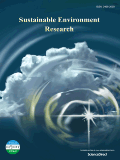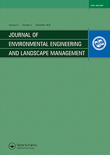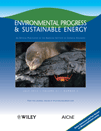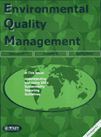
International Journal of Environmental Science and Technology
Scope & Guideline
Leading the charge in sustainable technology research.
Introduction
Aims and Scopes
- Water Treatment Technologies:
Research in this area emphasizes the development and optimization of various treatments for wastewater and contaminated water bodies, including advanced oxidation processes, electrocoagulation, and biosorption techniques. - Waste Management and Recycling:
This scope includes the investigation of sustainable practices for solid waste management, recycling technologies, and the valorization of waste materials for environmental benefits. - Environmental Pollution and Remediation:
Studies focus on the characterization of pollutants, their effects on ecosystems, and the development of bioremediation strategies using microbial and plant-based approaches. - Climate Change and Environmental Impact Assessments:
Research often involves modeling the impacts of climate change on various environmental parameters, including air quality, water resources, and biodiversity, along with assessments of mitigation strategies. - Renewable Energy and Sustainable Practices:
The journal promotes studies on renewable energy technologies, their integration into existing systems, and their potential to reduce environmental footprints. - Ecosystem Services and Biodiversity:
This area explores the relationship between environmental health, ecosystem services, and biodiversity, focusing on conservation strategies and ecological risk assessments. - Technological Innovations in Environmental Science:
Research involving the application of novel materials, nanotechnology, and other advanced techniques for environmental monitoring, remediation, and resource recovery.
Trending and Emerging
- Microbial and Phytoremediation Techniques:
There is an increasing interest in utilizing diverse microbial communities and plant species for the bioremediation of contaminated environments, reflecting a shift towards sustainable and eco-friendly solutions. - Nanotechnology in Environmental Applications:
Research involving the use of nanomaterials for pollutant removal and environmental monitoring is on the rise, showcasing advancements in material science and their applications in environmental technology. - Climate Change Mitigation Strategies:
Studies focusing on adaptive practices, resilience building, and the impacts of climate change on ecosystems are becoming more prevalent, indicating a heightened awareness of global climate issues. - Circular Economy Practices:
Research examining the principles of circular economy, waste-to-resource strategies, and sustainable product life cycles is gaining traction, reflecting an increasing emphasis on resource efficiency. - Artificial Intelligence and Machine Learning Applications:
The integration of AI and machine learning techniques for environmental data analysis, predictive modeling, and decision-making processes is emerging as a significant trend in recent publications. - Sustainable Agricultural Practices:
Research on the intersection of agriculture and environmental science, particularly in relation to sustainable practices that enhance soil health and reduce chemical inputs, is increasingly prominent. - Environmental Health and Safety Assessments:
There is a growing focus on the health impacts of environmental pollutants, especially in light of recent global health crises, leading to more studies on exposure risks and mitigation measures.
Declining or Waning
- Traditional Wastewater Treatment Methods:
As newer and more efficient technologies emerge, traditional methods of wastewater treatment are increasingly being overshadowed by innovative approaches, leading to fewer publications in this area. - Single-Species Bioremediation Studies:
Research focusing solely on the bioremediation potential of single microbial species has declined, with a shift towards more complex, multi-species interactions that better reflect natural ecosystems. - Static Environmental Impact Assessments:
Traditional static assessments are being replaced by dynamic and integrated approaches that take into account long-term impacts and interactions among various environmental components. - Conventional Energy Sources:
Research related to fossil fuels and conventional energy sources is decreasing as the focus shifts towards renewable energy solutions and sustainability practices.
Similar Journals

International Journal of Environmental Research
Championing rigorous research for a healthier planet.Welcome to the International Journal of Environmental Research, a premier publication in the field of environmental science, published by Springer International Publishing AG. With an ISSN of 1735-6865 and an E-ISSN of 2008-2304, this journal has established itself as a vital resource for researchers, professionals, and students committed to advancing the understanding of environmental issues. Since its inception in 2007, the journal has maintained an impressive Q2 ranking in Environmental Science (Miscellaneous) and holds a notable 70th percentile position in the Scopus rankings, reflecting its high-quality contributions and reputation in the academic community. While the journal is not Open Access, it provides a platform for rigorous, peer-reviewed research covering diverse topics in environmental science, thus fostering a collaborative and informed approach to addressing global environmental challenges. Located in Switzerland at Gewerbestrasse 11, Cham CH-6330, the journal is committed to publishing innovative research that informs policy and practice, making it an essential reference point for anyone engaged in the study and management of the environment.

ENVIRONMENTAL ENGINEERING SCIENCE
Driving impactful discoveries in environmental chemistry.ENVIRONMENTAL ENGINEERING SCIENCE is a leading journal published by MARY ANN LIEBERT, INC that provides a platform for pioneering research in the fields of environmental chemistry, pollution control, and waste management. With an ISSN of 1092-8758 and an E-ISSN of 1557-9018, this peer-reviewed journal aims to disseminate high-quality scientific studies that address critical environmental challenges. As evidenced by its 2023 category quartile rankings, it holds a notable position at Q3 in Environmental Chemistry and Pollution and Q2 in Waste Management and Disposal, highlighting its relevance and impact in these domains. Spanning over two decades from 1997 to 2024, the journal is dedicated to fostering innovations and promoting rigorous scholarship that can contribute significantly to sustainable environmental practices globally. Authors and researchers are encouraged to engage with this essential resource, which offers Open Access options to enhance the visibility and reach of their work. For those interested in advancing their understanding and practice within the environmental sciences, ENVIRONMENTAL ENGINEERING SCIENCE is an indispensable journal to consider.

Sustainable Environment Research
Fostering knowledge for a sustainable future.Sustainable Environment Research, an esteemed journal published by BMC, serves as a pivotal platform for disseminating innovative research in the fields of Environmental Engineering, Pollution, and Renewable Energy. Established in 2016 as an Open Access journal, it facilitates the widespread sharing of knowledge and advancements across the globe, reflecting its commitment to enhancing environmental sustainability. With an impressive Q1 ranking in multiple categories, including Water Science and Technology and Pollution, the journal is recognized for its significant impact, currently holding a rank of 31st in Environmental Science - Water Science and Technology. The journal actively invites researchers, professionals, and students to contribute to crucial discussions around sustainable practices and technologies, thus addressing worldwide environmental challenges. Based in Taiwan but accessible internationally, Sustainable Environment Research provides a valuable resource for those dedicated to advancing the science of sustainability.

Environmental Processes-An International Journal
Bridging Science and Sustainability for Global ImpactEnvironmental Processes-An International Journal, published by SPRINGER INT PUBL AG, serves as a vital platform for researchers and professionals dedicated to the dynamic field of environmental science. Established in 2014, this journal has rapidly gained prominence, currently holding a commendable Impact Factor and achieving impressive Scopus Rankings across various categories, including Q1 status in Water Science and Technology and Q2 in areas such as Environmental Engineering and Health, Toxicology and Mutagenesis. The journal emphasizes innovative research that contributes to the understanding and management of environmental processes and policies, addressing urgent challenges facing our planet. With a focus on high-quality, peer-reviewed content, Environmental Processes invites contributions that explore interdisciplinary approaches, making it a critical resource for scholars, policy-makers, and students invested in fostering a sustainable future through rigorous scientific inquiry. Access options are available for diverse readership, ensuring that essential findings are disseminated widely to inform decision-making and cultivate impact.

Journal of Environmental Engineering and Landscape Management
Advancing Sustainable Solutions for a Greener TomorrowJournal of Environmental Engineering and Landscape Management, published by VILNIUS GEDIMINAS TECH UNIV, serves as a pivotal platform for disseminating innovative research in the fields of environmental engineering and landscape management. With an Open Access policy since 2018, this journal fosters global knowledge exchange and accessibility, enhancing collaboration among researchers, professionals, and students alike. The journal, indexed under ISSN 1648-6897 and E-ISSN 1822-4199, features a diverse range of topics covering environmental engineering, management policies, and conservation strategies, thus contributing to sustainable development practices. As of 2023, it holds a Q3 quartile ranking across multiple categories, including Environmental Engineering and Nature and Landscape Conservation, demonstrating its commitment to excellence amidst competitive academic fields. The journal spans from 2004 to 2024, steadily solidifying its influence and relevance in shaping environmental discourse and practices. Join a vibrant community of scholars dedicated to addressing pressing environmental challenges through this distinguished publication.

Environmental Progress & Sustainable Energy
Empowering change for a greener tomorrow.Environmental Progress & Sustainable Energy, published by WILEY, is an influential journal dedicated to the crucial fields of environmental science and sustainable energy. Since its inception in 2009, this journal has consistently aimed to advance knowledge and understanding of innovative approaches and technologies that promote sustainability across various sectors. With an impact factor reflective of its strong academic contributions, the journal is catapulted into Q2 and Q3 quartiles across multiple categories, including Chemical Engineering and Environmental Science, demonstrating its central role in the dialogue surrounding pressing environmental issues. Researchers and professionals can access its cutting-edge studies through both traditional and open access options, facilitating the dissemination of knowledge globally. Addressed to an array of stakeholders from academia and industry alike, Environmental Progress & Sustainable Energy is not only a repository of research but also a platform for transformative ideas that aim to pave the way for a more sustainable future, making it an essential resource for those committed to the interplay of environmental stewardship and energy innovation.

GLOBAL CHALLENGES
Bridging Knowledge Across Borders and Disciplines.GLOBAL CHALLENGES is a leading multidisciplinary journal published by Wiley-V C H Verlag GmbH, dedicated to addressing the critical and complex issues faced by our global society today. Since its inception in 2017, the journal has embraced an Open Access model, ensuring that its innovative research is readily available to a wider audience, fostering collaboration and knowledge sharing. With an impressive Q1 ranking in the Multidisciplinary category for 2023, it positions itself among the top 8% of journals in the field, further solidified by its 93rd percentile rank in Scopus. Covering a broad range of topics that intersect various disciplines, the journal seeks to inspire researchers, professionals, and students alike to engage with and contribute to solutions that resonate across diverse sectors. The ongoing commitment to advancing scientific knowledge and tackling pressing global challenges makes GLOBAL CHALLENGES an essential resource for anyone invested in the future of our planet.

Environmental Science-Advances
Advancing knowledge for a sustainable future.Environmental Science-Advances, published by the esteemed Royal Society of Chemistry, is a pioneering open-access journal dedicated to advancing the field of environmental sciences. Having commenced publication in 2022, this journal serves as a vital platform for the rapid dissemination of high-quality research covering a broad scope, including environmental chemistry, pollution management, water science and technology, and environmental engineering. With its commitment to open access, it ensures that vital environmental research is freely available to researchers, professionals, and students worldwide, thus fostering collaboration and innovation in addressing pressing environmental challenges. Currently, the journal is ranked in the Q2 and Q3 quartiles across various categories such as Environmental Engineering and Water Science, indicating its growing influence within the academic community. With the global imperative for sustainable environmental solutions, Environmental Science-Advances is positioned to become an invaluable resource for those dedicated to the study and solution of environmental issues.

ENVIRONMENTAL QUALITY MANAGEMENT
Elevating Standards in Environmental Research and ManagementENVIRONMENTAL QUALITY MANAGEMENT is a respected journal published by WILEY, focusing on interdisciplinary studies that merge environmental science with public health, management, policy, and law. Since its inception in 1991, this journal has provided a platform for researchers and practitioners to share innovative insights and advancements in understanding environmental quality and its impacts on human health and the ecosystem. With an ISSN of 1088-1913 and an E-ISSN of 1520-6483, it holds a significant position in the academic community, evidenced by its presence in the Q3 quartile across several categories, including Management, Monitoring, Policy and Law, as well as Pollution and Waste Management. Although it is not an open-access journal, it continues to be a vital resource for those in the environmental sector, offering robust evaluations and discussions that advance knowledge and foster improved practices. With Scopus rankings demonstrating its relevance among other titles in the field, ENVIRONMENTAL QUALITY MANAGEMENT plays a crucial role in shaping discourse and informing policy in an increasingly vital area of study.

ENVIRONMENTAL SCIENCE AND POLLUTION RESEARCH
Exploring Solutions for a Sustainable FutureEnvironmental Science and Pollution Research is a premier international journal published by Springer Heidelberg, dedicated to advancing knowledge in the field of environmental science and pollution. With an impressive impact factor reflecting its vital contributions to research, the journal is categorized in the top quartiles (Q1 and Q2) across several domains, including Health, Toxicology and Mutagenesis, and Environmental Chemistry. Established in 1994, it continues to be a critical resource for researchers, professionals, and students focusing on pressing environmental issues. The journal provides an insightful platform for disseminating significant findings related to pollution and its effects on health and the environment, contributing to a better understanding and resolution of these challenges. While it currently does not offer Open Access options, its inclusion in prominent rankings, such as the Scopus rankings, underscores its reputation and influence within the scientific community.